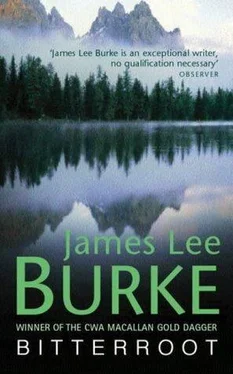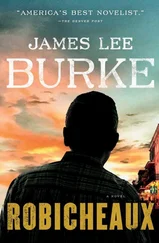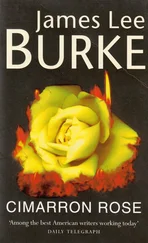I pulled into a gravel parking area on the side of the house. Molinari shut down the pitching machine and opened a door in the batting cage and came toward me, dressed only in tennis shoes and knee-length socks and cutoff sweatpants that were hitched tightly into his genitalia.
"Am I gonna have trouble here?" he said. "Call somebody if you feel uncomfortable," I replied.
"If I call anybody, it'll be for an ambulance. You're starting to be a nuisance."
"You bashed Cleo Lonnigan's carpenter. I got picked up for it. While I was in jail, a friend of mine was buried alive by Wyatt Dixon."
His eyes fixed on mine, as though reading significance in my words that only he understood. He scratched at a pimple on top of his shoulder.
"I'm sorry about the carpenter, but it's not on me. Cleo is sitting on money that don't belong to her. I told you, the people her husband stiffed give out motivational lessons nobody forgets. Her husband didn't learn that lesson, either, and it got him and his kid killed," he said.
He squeezed the pimple until it popped, then brushed at his skin.
"Save the shuck for your hired morons. My friend and I took your weight. That means if Wyatt Dixon comes around my friend again, I'm going to be out to see you," I said.
"Right," he said, and looked off into the breeze. His skin was olive-toned and looked cool and taut in the sunshine. "You want to hit some in the cage?"
"No."
"Don't go, man. What do you think of Xavier Girard as a writer?"
"Why?"
"Because he's writing my life story. Because I've told him stuff I don't tell everybody."
"What stuff?"
"You asked me once how I got out of Laos. I rode out on the skid of a helicopter. Except I pushed another guy off the skid. A GI. At five hundred feet." His eyes left mine, then came back and refocused on me again. His face seemed to energize, as though the answer to all his questions lay within inches of his grasp. "After you capped your friend, that other Texas Ranger, you saw a shrink?"
I wanted to simply walk away, to pretend I was above his inquisition and his criminal level of morality. He waited, his face expectant. A woman with dyed red hair came out of the house and got into a convertible with a bright white top and began blowing the horn at him.
"Shut up that damn noise!" he yelled at her, then turned back to me. "How'd you get that guy off your conscience?"
"I didn't. I never dealt with it. I feel sorry for you," I said.
"You never dealt-" he said, then stopped and pressed his fingers in the center of his forehead, his mouth open slightly, as though he were fingering a tumor or perhaps recognizing a brother-in-arms.
That same day Carl Hinkel drifted his single-engine plane on currents of warm air above the Bitterroot River and landed on a freshly mowed pasture at the rear of his ranch. As soon as Wyatt Dixon stepped from the passenger door, he was arrested by two sheriff's deputies. But before they could cuff him he peeled off his T-shirt and shook it loose from his hand like a stripteaser on a stage. The veins and tendons in his upper torso looked like the root system in a tree.
"Please notice I am burned from the neck all the way down one shoulder," he said, lifting a thick pad of grease-stained bandages from his skin. "I am placing myself at y'all's disposal, with hopes you will take me to a hospital. It is civil servants such as yourself a rodeo cowboy must turn to when he don't have enough sense not to drop a red-hot car muffler on his face."
He held his right hand in stiff salute against his eyebrow.
The voice lineup consisted of an escaped Arkansas convict who was being held in the county jail, a toothless cook at the transient shelter, a sheriff's deputy from Sweetwater, Texas, an insane street preacher who spent the day shouting at traffic in the middle of town, and a university speech therapist from Oklahoma whose voice sounded like wire being pulled through a hole in a tin can. Together, they represented a cross section of mushmouth and adenoidal Southern accents that would have probably caused Shakespeare to burn his texts and rewrite his plays in Cantonese.
But the lineup was not like one shown in television dramas. Neither the city police nor the sheriff's department had a stage, and the latter did not even have an interview room large enough to accommodate the six men who were to take part in the voice identification. So the sheriff recorded Wyatt Dixon and the five other men on cassettes and numbered each cassette one through six. Each man read the same statement into the microphone: "This world has done become a toilet."
Then Temple sat in the sheriff's office, a notepad on her knee, and listened to the cassettes, one at a time, while I sat behind her.
She was attentive, motionless, her head lowered slightly, while the sheriff played the first four. Then he put the fifth cassette into the machine and hit the play button. The voice was Wyatt Dixon's, but without dramatic emphasis, devoid of the manufactured and startled tone that characterized his speech. Temple raised her head, as though she were going to speak, then she motioned the sheriff to play the sixth tape.
"There ain't no hurry. You want me to play any of them again?" the sheriff asked.
"Number two and five," she said.
"Yes, ma'am," he said.
She listened again, then nodded, her lips crimping together.
"It's number two," she said.
The sheriff slapped the back of his head and blew out his breath.
"No?" she said.
"You just picked out my deputy," the sheriff said. He looked at me, his cheeks puffed with air.
"Don't say what I think you're fixing to," I said.
"I got to kick him loose. Terry Witherspoon got rid of the pipe tape you called me about. There are no latents in Ms. Carrol's vehicle. Three or four people over in Billings are willing to swear Dixon was at the rodeo when Ms. Carrol was abducted," he said.
"Which people in Billings?" I asked.
"A prostitute and Carl Hinkel and a couple of ex-convicts. He don't hang out with your regular civic club types."
"Talk to them about the consequences for perjury. Bring in Witherspoon. Put him in a cell full of Indians and blacks and lose his paperwork," I said.
"Come on, Ms. Carrol, I'll walk you to your car," the sheriff said, ignoring me.
"I can manage, thank you," she replied.
"Don't misinterpret the gesture. I'm just going across the street to buy my grandson a birthday present. Counselor, one way or another I'm gonna put Wyatt Dixon and this Witherspoon kid out of business. But in the meantime they'd better remain the healthiest pair of white trash in Missoula County. We clear on this?"
"Not really," I said.
He hooked on his glasses and studied the calendar on his desk.
"You got about three weeks before Dr. Voss goes to trial for Lamar Ellison's murder. Why don't you turn your attentions to your profession and quit pretending you're still a lawman?" he said.
"Don't you dare speak down to him like that. He was a Texas Ranger. In the old days he and his partner would have fed Wyatt Dixon into a hay baler," Temple said.
The sheriff flexed his dentures and tried to obscure his face when he fitted on his hat, but he could not hide the embarrassed light in his eyes.
THAT NIGHT Lucas returned late from Sue Lynn's house. Through my bedroom window I saw him build a fire by his tent and squat next to the flames and slice open a can with his pocketknife and pour the contents into a skillet. I put on a coat and walked down to the riverbank and sat on a stump behind him without his hearing me.
"Lordy, you give me a start!" he said when he saw me.
"Guilty conscience?" I said.
He stirred the corned beef hash in the skillet and sprinkled red pepper on it. "You was born for the pulpit, Billy Bob," he said.
Читать дальше












